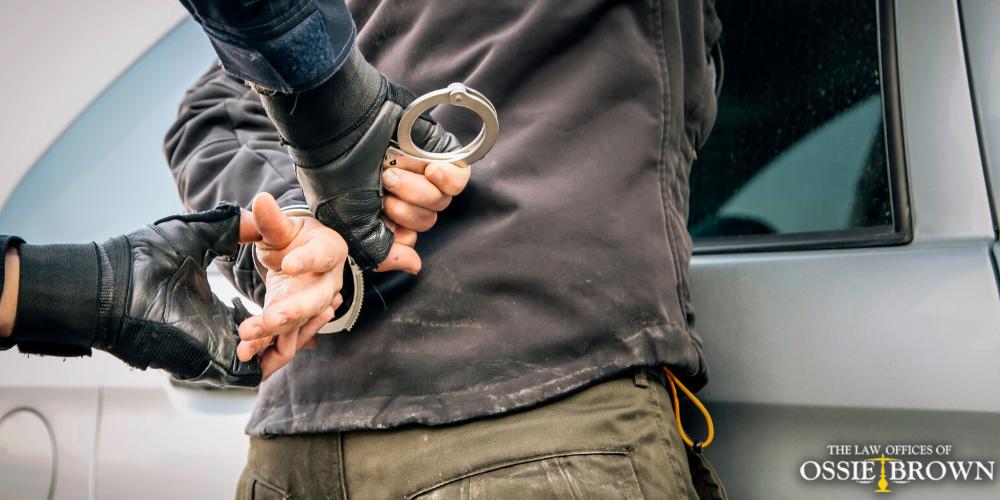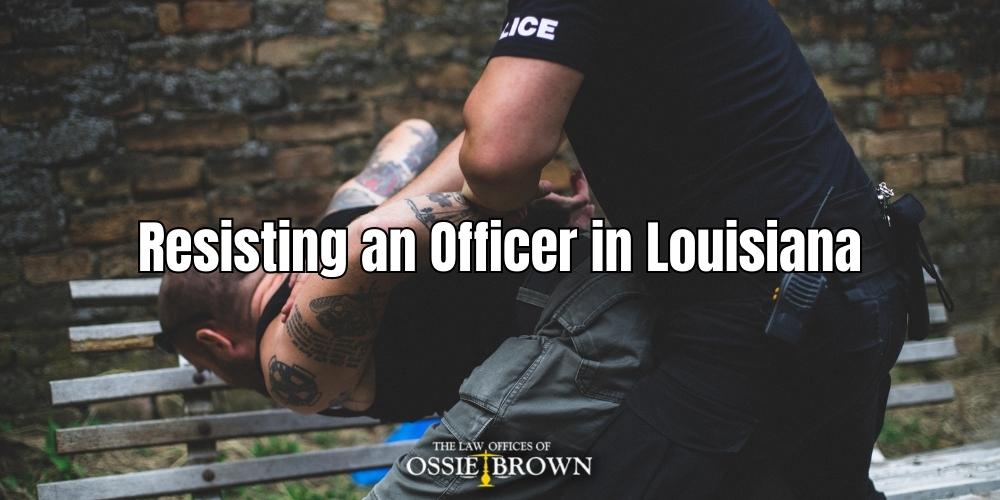In Louisiana, resisting an officer basically means resisting arrest, with or without violence, or interfering with any duties under a peace officer’s official authority. This is a serious crime in the state of Louisiana that can result in jail time, fines, and a permanently tainted criminal record. However, if you’ve watched national news at all in the last few years, you know that not all arrests by law enforcement are legal. Some police officers don’t have reasonable cause to arrest someone, and some just begin inflicting unreasonable violence for no reason. Are arrestees in these situations still expected to submit to the arrest, or can they resist without facing criminal charges later? Below, our Baton Rouge criminal defense attorneys break down everything you need to know about resisting arrest laws in the state of Louisiana.
If you are facing criminal charges for drug crimes, violent crimes, sex crimes, theft crimes, white collar crimes, or any other type of crime, it’s crucial to hire strong legal representation. The legal team at the Law Offices of Ossie Brown have been protecting and defending Louisianans since 1984. Allow us to do the same for you. Call a Baton Rouge drug crimes lawyer, Baton Rouge violent crimes defense lawyer, Baton Rouge sex crimes lawyer, Baton Rouge theft lawyer, or a Baton Rouge white collar crime lawyer at 225-343-1111 to schedule a free consultation today.
What Does it Mean to Resist an Officer in Louisiana?
According to Louisiana law (RS 14:108), resisting an officer means interfering, opposing, or obstructing an officer who is authorized to make a lawful arrest, lawful detention, or seizure of property when the offender knows that the officer has the authority to do so. Louisiana law also states that an “officer” could be any law enforcement personnel including deputy sheriffs, peace officers, municipal police officers, city deputies and marshals, parole and probation officers, and wildlife enforcement agents.
Common examples of resisting an officer can include:
- Running away during an arrest,
- Fighting or using any type of physical force during an arrest,
- An offender refusing to reveal their name or identity during arrest,
- An offender providing a false name or identity during arrest,
- Congregating in a public street with other people and refusing to move despite an officer’s request,
- Interfering with a police cordon by walking or flying an unmanned aircraft system (UAS) into the blocked off area.
Resisting an Officer With Force or Violence
In Louisiana, resisting an officer and resisting an officer with force or violence are considered two separate charges, with the former being a misdemeanor and the latter being a felony.
According to Louisiana law (RS 14:108.2), resisting an officer with force or violence means that an offender:
- Uses threats or physical force towards a police officer before they restrain, arrest, or detain them,
- Uses threats or physical force towards a police officer after they have been arrested or detained but before they’re imprisoned,
- Causes physical injury (or attempts to cause physical injury) towards a police officer who is performing their normal duties,
- Uses threats or excessive force towards a law enforcement officer who is performing their normal duties.
Threatening or causing physical injury towards a law enforcement official (with or without a deadly or dangerous weapon) is a very serious crime in the state of Louisiana that can result in hefty fines and jail time. We’ll discuss penalties later, but first, let’s discuss the elements that make up the charge of resisting an officer.

Elements of a “Resisting an Officer” Charge
In order to obtain resisting arrest charges, your case must have all of the following elements: there was a lawful arrest, there was intentional resistance, and there was interference or obstruction.
Lawful Arrest
Firstly, a person can only “resist arrest” when there is a lawful arrest occurring. If the arresting officer doesn’t have the authority or reasoning to make an arrest to begin with, then naturally the arrested person is going to resist. This situation does not constitute resisting arrest, because the officer has no lawful reason to do so.
Intentional Resistance
Secondly, the arrested party must intentionally resist arrest. So again, if an officer or deputy sheriff is committing some kind of unlawful arrest, and the offender resists in some way, this may or may not fall under the definition of “intentional resistance.” Some states and jurisdictions require people to submit to even an unlawful arrest. So be sure to speak with an experienced criminal defense attorney about the details of your case before you speak further with law enforcement officers.
Intentional resistance can also include something called passive resistance. This means that a defendant intentionally resisted arrest through some kind of nonviolent physical act or failure to act in order to delay or prevent arrest from occurring. Methods of passive resistance could be making your body limp while an officer tries to arrest you, therefore making the whole process much more difficult and time-consuming.
Interference or Obstruction
In Louisiana, resisting an officer doesn’t just mean evading arrest. It could also mean interfering with any official duties of a police officer, peace officer, correctional officer, probation officer, parole officer, or any other type of uniformed officer.
Louisiana law also includes very specific examples of obstructing an officer, including running away from an officer during arrest, becoming violent towards an officer after arrest but before imprisonment, refusing to state your identity, etc.
Penalties for Resisting an Officer in Louisiana
If an arrested or detained party is proven guilty beyond reasonable doubt of resisting an officer, then they can face serious penalties.
Resisting arrest or resisting an officer without threatening or inflicting violence is a misdemeanor offense in the state of Louisiana. A person convicted of misdemeanor resisting arrest can face a 6 month prison sentence and/or a maximum fine of $500.
If you’re wondering: is threatening or inflicting violence while resisting arrest a felony offense? In Louisiana, the answer is yes. A felony resisting arrest charge can result in 1 to 3 years of jail time, with or without hard labor, and/or a maximum fine of $2,000.
Possible Defenses for Resisting an Officer in Louisiana
Resisting arrest charges are very serious and can stay on your criminal record forever. Do indictments mean jail time in Louisiana? Potentially.
That’s why it’s so important to hire an experienced criminal defense lawyer at the Law Offices of Ossie Brown. We can analyze the details of your situation and help you formulate a strong defense so that you may obtain a reduced sentence, fine, or charge.
Our criminal defense lawyers may be able to use these defenses in your favor: self-defense and unlawful arrest.
Self-Defense
If you’ve ever watched the news in the past few years, you have probably heard countless stories about officers using unreasonable or excessive force during an arrest. If an arresting officer acts violently and has no justifiable reason to do so, then a reasonable person may try to protect themselves by fighting back.
However, in order to successfully use self-defense in Louisiana as a defense in court, the person being arrested must use reasonable force to protect themselves from the officer. For example, if an officer hits the arrestee in the face, the arrestee can’t respond by grabbing a gun and shooting them under the gun laws in Louisiana. Many courts would consider this as an unreasonable amount of force to use for self-defense. Additionally, the person being arrested can’t have been the first one to use violent force. If they were the first to lash out violently at an officer, then they can’t claim self-defense.
Unlawful Arrest
Unlawful or illegal arrest means that a police officer is arresting someone without probable cause or a warrant. Essentially, an illegal arrest is one that happens for seemingly no reason. Naturally, someone who is getting arrested for no reason would want to resist. If they decide to resist, they must use only the force warranted given the situation. So again, if someone is being wrongfully arrested, they can’t resist by picking up a gun and shooting.
Some states and jurisdictions mandate that everyone submit to arrest, even an unlawful arrest, as long as the officer has the legal authority to do so. That’s because resisting arrest can easily become physically violent for all parties involved, and it’s easier to just submit for the time being.
However, Louisiana law allows its people to resist an illegal arrest. If you resist and still end up in jail anyway, make sure that your first phone call is to a Baton Rouge criminal defense attorney at the Law Offices of Ossie Brown. We will defend your legal rights and reputation.

Criminal Defense Lawyer for Resisting an Officer in Baton Rouge
If you’ve been arrested or charged for any type of criminal offense in the state of Louisiana, whether it be resisting an officer, a DUI, a theft crime, a sex crime, or a violent crime, you need to hire the strongest possible legal representation. Our Baton Rouge criminal defense lawyers will protect your legal rights, support you through the entire legal process, and help you obtain the best possible case outcome. Call 225-343-1111 to schedule a free consultation at the Law Offices of Ossie Brown today.


